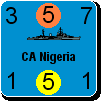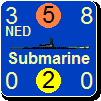Orm
Posts: 22154
Joined: 5/3/2008
From: Sweden
Status: offline

|
quote:
ORIGINAL: warspite1
quote:
ORIGINAL: Orm
quote:
So can I assume I have played this game as a complete and utter pillock as the Axis and that the CW has won?
You forget that the CW player made a ridiculously high bid for CW so CW need to capture lots more Vicory Points if they want to win.  
But with that said I am pretty sure that the Allies have already won this game. But they do need to make it so and that could be plenty of fun for them. Remember that Axis have had their fun so now it is time to let the Allies have theirs. 
warspite1
Have I missed something? Where did the bids come in?? I'm confused...
Bidding is something that is often done in multiplayer games in order to determine a winner.
24.1.2 Which side?
....
Bidding
Bid for control of major power groups. Each bid represents the number
of objectives more or less than your expected total you believe you will
control at the end of the game.
A bid must be a whole number of -20 or greater.
Bidding is auction style ~ you can bid any number of times. The eventual
highest bidder chooses any of the major power groups and takes no
further part in the bidding.
The remaining players go through another round of bidding, again
starting at -20. The new highest bidder chooses one of the remaining
major power groups. The bidding continues until there is only 1 player
left. That player gets the last group for 0, minus the total of the other
players’ unmodified bids.
Each player’s modified bid is calculated at game end, and equals their bid
plus their currently controlled major power’s (which may change during
the game—see 13.7.5) expected total.
Example: Five of us sit down to play a game of the 1939~45 Global War
campaign. 8 major powers are available in this campaign (5 Allied and
3 Axis).
The first round of bidding was mainly a two way bidding war between
Susan and me. Susan wins with a bid of 5 and picks the USA and
nationalist China. Her modifi ed bid is 24 (17+2+5). Pretty aggressive ~
I guess the Soviets can kiss lend-lease good-bye.
Next round, Mike & I fight it out. I dip out at 5. Mike wins with 6 and
chooses Germany for a modified 16 (10+6). Although it is unusual for
the following bids to be higher than the initial, I guess Mike is counting
on internal Allied disputes to make his job easier.
In the next round, I bid Braddles up to 1, and (typically) he chooses the
Commonwealth for a modified bid of 20 (19+1).
The 4th round starts with just Greg and me left. Because the total bids so
far are 12 (5+6+1), the last group will go for -12 less whatever we bid.
Greg makes the highest bid at -4, and chooses the Soviet Union, France
and the Chinese Communists with a modified bid of 10 (13+1-4) which
will reduce to 9 if France is liberated by another major power during
the game.
This leaves me with Japan and Italy for a total of -3 (i.e. 5 less the total
of everyone else’s bids (5+6+1-4)).
Record your bid on the builds charts. Your modifi ed bid will be subtracted
from your objective total at the end of the game (see 13.8).
Historically, each major power controlled the following objectives by the
end of Jul/Aug 1945:
European maps (32 in total): the Commonwealth ~12, France~4, USA~4
& USSR~12;
Pacifi c & Asia maps (27): Nat. China ~ 1, the Commonwealth ~ 8,
France ~ 1, Japan ~ 9, USA ~ 5 and USSR (including communist
Chinese) ~ 3;
America map (8): the Commonwealth ~ 2 and the USA ~ 6 (she would
reduce that number to 5 for aligning with both Mexico and Brazil ~ see
13.8 & 19.8);
Total (67): Nat.China ~ 1, the Commonwealth ~ 22, France ~ 5, Japan ~
9, USA ~ 15 and USSR ~ 15.
Be aware that the Allies followed an anti-German strategy so Germany
(at 0) is probably under-rated and Japan over-rated.

 Attachment (1) Attachment (1)
< Message edited by Orm -- 9/8/2014 7:16:26 PM >
_____________________________
Have a bit more patience with newbies. Of course some of them act dumb -- they're often students, for heaven's sake. - Terry Pratchett
|
 Printable Version
Printable Version













 But enough of that old cobblers I'm babbling on because, even though I am competing with myself, I am genuinely nervous about this result
But enough of that old cobblers I'm babbling on because, even though I am competing with myself, I am genuinely nervous about this result 











 New Messages
New Messages No New Messages
No New Messages Hot Topic w/ New Messages
Hot Topic w/ New Messages Hot Topic w/o New Messages
Hot Topic w/o New Messages Locked w/ New Messages
Locked w/ New Messages Locked w/o New Messages
Locked w/o New Messages Post New Thread
Post New Thread